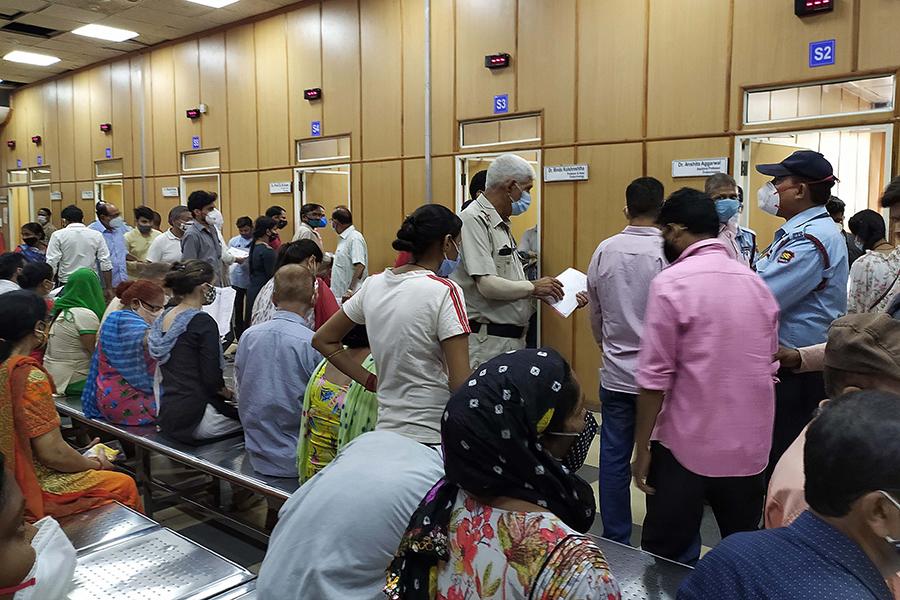Are we ready for the silently approaching wave of non-communicable diseases?
It is increasingly looking possible that an unprecedented surge in lifestyle diseases and delayed care will be an additional repercussion from Covid-19 impacting health outcomes.
Having wreaked havoc on populations across the globe, Covid-19 has not been any kinder to our resource-starved population in India, and has overburdened our healthcare system. While the first wave of the pandemic saw an unprecedented rush to secure drugs, critical equipment, hospital infrastructure, and skilled manpower through 2020, some early measures stymied a large-scale negative impact on India. In 2021, despite the advancements in the vaccination programme, infrastructure, treatment protocols, and relentless efforts of our medical and sanitation fraternity, we have lost thousands of precious lives to the second, more virulent tsunami.
India’s high burden of co-morbid, non-communicable diseases—in particular, cancer, heart disease, hypertension and diabetes—presents a higher risk factor for severe Covid-19 mortality or long-term systemic consequences for recovered patients. In addition, lockdowns, postponements in surgeries, fear of infection, and a greater number of hospitals tending to only Covid-19 patients have pushed non-communicable diseases (NCDs) on the backburner. In all probability, we have yet another pandemic silently creeping up on us.
As hospitals are fully occupied with Covid-19 patients— struggling to supply oxygen and critical medicines—there are numerous non-Covid-19 patients suffering in the absence of adequate medical attention and treatment, often with far worse positive odds than Covid-19. Chronic disease management demands close follow up, monitoring, and adherence to medication and lifestyle habits. These have been adversely affected, further jeopardising the health condition of patients with chronic illnesses.
However, this is not only limited to chronic diseases. The Global Financing Facility, which has been tracking the impact of Covid-19 on maternal and child services after the first wave in 2020, has already flagged disconcerting dips in child immunisation, outpatient consultations, and rising risk of complications from pregnancy.
A survey conducted by NATHEALTH-Healthcare Federation of India in partnership with IQVIA with 2,500 patients across tier 1 and tier 2 cities in early 2021 showed that 57 percent of the respondents had rescheduled their surgery plans, and 100 percent of the elective surgery patients had cancelled, postponed, or rescheduled their surgeries. In addition, 82 percent of these patients expressed an urgent need to get their treatments by June 2021. The survey also highlighted that 34 percent of Out Patient Department (OPD) patients had cancelled or rescheduled their OPD visits, with 95 percent of them wanting to be treated in the same hospital. 62 percent of them believed that their health has been negatively impacted.
Another study released by Apollo Hospitals group in April 2021 revealed that deaths attributed to NCDs have risen to 64.9 percent. The study also highlights how NCDs pose a greater mortality risk from Covid-19. According to Globocan 2020 India statistics, oral cancers account for 1,35,929 new cases every year and 75,290 deaths annually. Seven lakh new cases of head and neck cancers are detected every year. These figures tell us how cancer has spread during the past decade and many of these patients can be deprived of critical medical care, chemotherapy/radiation treatments and surgeries under the current circumstances.
Apart from Covid-19, hospitals treat many other severe diseases and have several specialists such as cardiologists, ENT specialists, nephrologists, oncologists and so on, on their payroll. However, currently, many of them are involved in Covid-19 treatment, leaving them unable to conduct essential surgeries and look after other non-Covid-19 patients.
This also has a ripple effect that disrupts the entire supply chain of medical equipment, diagnostics, and pharmaceuticals. Planning mechanisms need to resolve how resources can be ring-fenced among Covid-19 and non-Covid-19 treatments to prevent a surge in NCDs soon. If not mitigated in time, we are staring at a bigger third wave as these patients with preexisting co-morbidities, who have postponed their surgeries in the last 15 months, will require significant medical assistance. While other diseases may have been ignored due to the focus on Covid-19 treatment protocols, ventilators, and oxygen, they are festering and will eventually come to bear.
With rising uncertainties and vulnerabilities, our medical experts and professionals are still uncertain as to when the pandemic would end or what will usher in a new normal for this decade. As a community, we must take responsibility for our well-being which can only be done through preventive checks, regular monitoring, and adherence to prescribed medication, overseen by medical professionals at hospitals. Priority needs to be accorded to both Covid-19 and non-Covid-19 treatment.
Irrespective of further waves, a core task force can devise comprehensive strategies to manage and ring-fence both Covid-19 and non-Covid-19 management. Collective cooperation has helped the world overcome challenges, natural disasters, diseases, and epidemics. While Covid-19 presents unparalleled challenges, it should not be allowed to determine attitudes and dictate outcomes towards our health or about visiting hospitals or primary and secondary clinics, when necessary. It is increasingly looking possible that an unprecedented surge in lifestyle diseases and delayed care will be an additional repercussion from Covid-19 impacting health outcomes. It does not necessarily have to be this way. Defeating Covid-19 is important, but the victory should not be Pyrrhic.
About authors: Siddhartha Bhattacharya is a Secretary-General at NATHEALTH & Abhishek Anand is the founder and CEO of XQtiv Consulting.
The thoughts and opinions shared here are of the author.
Check out our end of season subscription discounts with a Moneycontrol pro subscription absolutely free. Use code EOSO2021. Click here for details.
